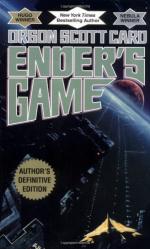|
This section contains 256 words (approx. 1 page at 400 words per page) |

|
Ender's Game Summary & Study Guide Description
Ender's Game Summary & Study Guide includes comprehensive information and analysis to help you understand the book. This study guide contains the following sections:
This detailed literature summary also contains Bibliography and a Free Quiz on Ender's Game by Orson Scott Card.
Orson Scott Card first wrote Ender's Game as a short story in 1975 He submitted the work to a leading science fiction magazine, Analog, hoping to make some money to help pay his school debts. Not only did Analog publish the story, the 1977 World Science Fiction Convention nominated it for a Hugo Award and gave Card the John W. Campbell Award for best new writer. In 1985, the author developed Ender's Game into a novel, and it became the work which established his reputation as one of science fiction's most prominent new writers. This longer version swept both the Hugo and Nebula Awards, the most prestigious accolades given to science fiction and fantasy works. A favorite with readers, the novel has inspired three additional works featuring Ender Wiggin and his struggles to understand the universe.
Ender's Game follows the training of Andrew "Ender" Wiggin, a six-year-old genius who may be Earth's only hope for Victory against an invasion of insectoid aliens. While most critics consider the plot elements of human-against-alien and the child soldier to be science-fiction cliché, Card renders them new with his stress on the underlying themes of empathy, compassion, and moral intent. It is only Ender's ability to empathize with the "buggers" that enables him to overcome them, and the reader experiences his solitude, anguish, and remorse over his various "victories." As a result, Michael Collings noted in the Fantasy Review, the novel "succeed[s] equally as straightforward SF adventure and as [an] allegorical, analogical disquisition ... on humanity, morality, salvation, and redemption."
Read more from the Study Guide
|
This section contains 256 words (approx. 1 page at 400 words per page) |

|



